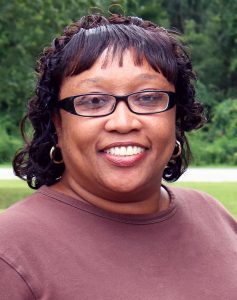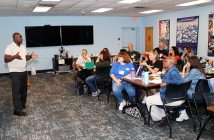Editor’s Note: Shop stewards are the foundation of CSEA. Many times, they are the initial contact person for members’ concerns. In addition to that, they are organizers, advocates and educators. To ensure that these very important activists receive the credit that they deserve, the “Principal Steward” profile was born.
This month’s “Principal Steward” is Jean Harris, who works as an office assistant at SUNY Old Westbury.
In addition to her work as a shop steward, Harris serves as secretary/treasurer of our SUNY Old Westbury Local.
She was also a member of CSEA’s most recent state contract negotiating team for a year-and-a-half before leaving the team due to a medical condition.
Long Island Reporter (LIR): What made you decide to be a shop steward?
Jean Harris (JH): Initially, I just wanted to be a part of CSEA. I wanted to do anything that I could to help. I was told that the best way to start out was to do shop steward training. So I said, ‘bring it on.’
LIR: How long have you been a shop steward?
JH: Since about 2006.
LIR: What’s the most rewarding thing about being a shop steward?
JH: I get to interact with our membership, and work with our members to find a solution to their problems.
LIR: What’s the most challenging thing about being a shop steward?
JH: Getting people to step up. They want you to help them, but at the same time, they’re afraid to step up.
LIR: How do you address that issue?
JH: I let them know that they have rights. It’s not about your employer retaliating against you. It’s about fighting for what’s right in terms of the contract. If something is going on that’s against the contract, you’re supposed to speak up because there’s an agreement between our union and the state.
LIR: Did you have a mentor?
JH: I did — Andre Sigmone (a former CSEA member and current CSEA labor relations specialist). He told me that he thought that I would be a good activist, and that he was going to make sure that I took classes and was properly trained. He also went to some classes with me.
LIR: How did it make you feel that someone saw activist potential in you?
JH: It made me feel really good that someone saw my leadership qualities. I didn’t know him too well at the time. I liked the fact that he approached me. It made me feel more confident about getting more involved in the union.
LIR: Do you think that’s the key to getting members more involved, having another member approach them?
JH: Yes, especially with the new employees. You have to bring them in right away so they know that they’re not alone.
LIR: Is there any situation that stands out in which you really felt that you accomplished something really important?
JH: I’ve helped to get people’s shifts changed. Management told me that they don’t normally do that, but I was able to do it for a few people.
LIR: Do you think that your effectiveness has anything to do with the relationship that you developed with management?
JH: Yes. I learned how to develop good working relationships with management through the different workshops and trainings that CSEA offers. We’re not supposed to butt heads with the other side, just because they’re management. We’re supposed to try to work together to accomplish the best result for everyone.
LIR: Tell me more about the shop steward training? How was it beneficial?
JH: There was a lot of role playing and conversations about situations that you could find yourself in as a shop steward. I was able to develop my communications skills and learn how to ask the right questions. Knowing what to ask is a big part of being a shop steward and learning how to investigate details so you’re better able to assist a person.
LIR: What advice do you have for new shop stewards?
JH: Learn all that you can. Ask the questions. Take the trainings. Talk to people who have been around for a while. Don’t be afraid if you don’t know something. A lot of people are afraid to admit what they don’t know. I always tell them that it’s OK if they don’t have the answer all of the time. It’s more harmful when people do know the answer and don’t do anything about it.
I also tell them that it’s important to read the literature. We get [The Work Force] every month. You’d be surprised how many members don’t read it. I have to tell people all of the time that the paper is where the information is. Sometimes, people want you to spoon-feed them. I tell them that sometimes they have to do the work.
LIR: What is ‘the work?’
JH: Learning what your needs are and trying to find the answer. You don’t have to go to the library to look things up anymore. We have a website (cseany.org); all of the information is right at your fingertips. You can call someone or ask the people around you. Sometimes, it’s better to do the research yourself because you retain the information better than when someone just tells you.
I also tell people to go to member meetings. A lot of times they aren’t interested in attending because they don’t think they’re going to get anything out of it. That’s when I tell them that they have to change their attitude. You have to look at things from a different perspective if you’re going to gain anything. The meetings are also where you can get the answers to your questions.
I can lead you. I can guide you. I can assist you, but I can’t make you do anything. If someone wants something bad enough, they’ll go after it.
LIR: What do you want people to know about being a shop steward?
JH: It’s challenging. You have to learn to read between the lines and investigate thoroughly because everyone has their own outlook on what happened. You don’t just go by what the people that were involved have to say about a situation. You have to speak to people that were witnesses to the incident. You have to be able to listen and have go perception.
LIR: Any final thoughts?
JH: People need to know that unions are in trouble. Employers are really trying to get rid of unionized workers.
New York state is one of the states that have a strong union history and we need to keep that. I don’t want to be one of those workers who don’t have protection; who are afraid to say anything. If you’re in a union, you need to use it to your advantage and become involved. Learn what unions are about. Learn what your benefits are. Get to know the people that are in positions that can help you. A lot of people know about the constitutional convention, but they really don’t know what’s at stake.
It’s critical for us, as unionized people, to work together, to never quit, to stand up, and to not be afraid.
— Wendi Bowie




